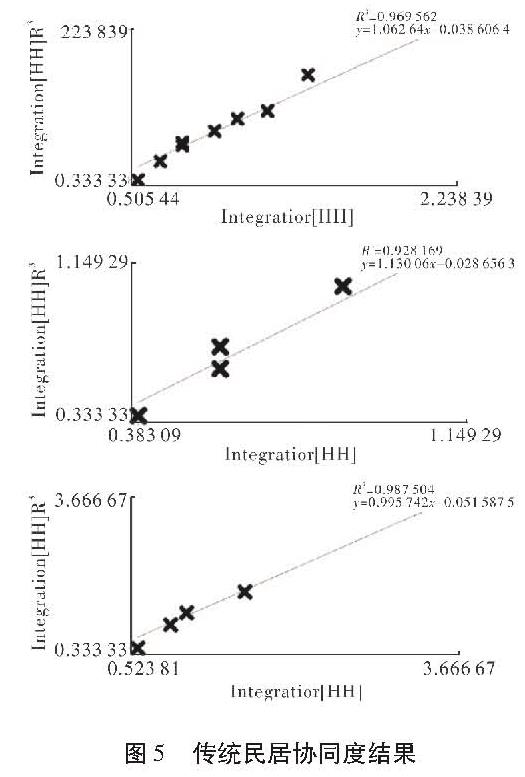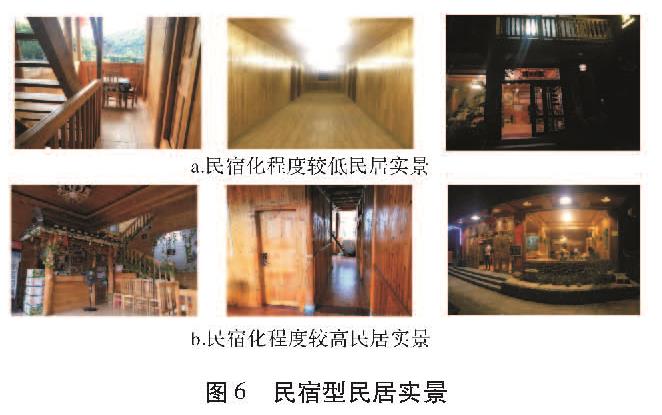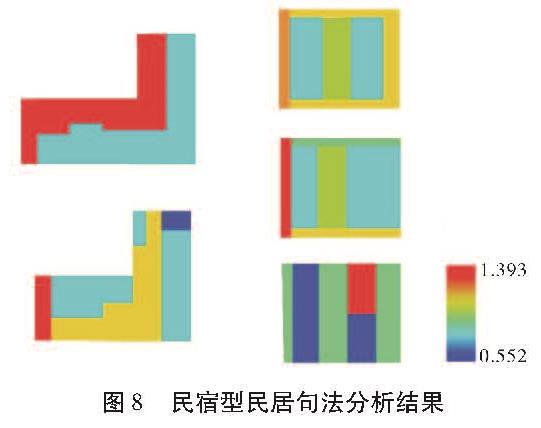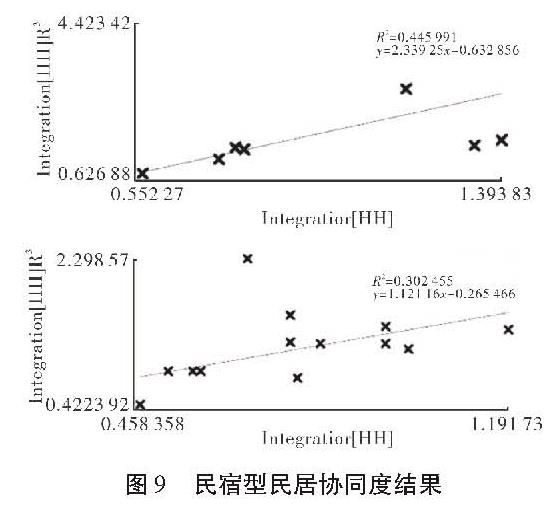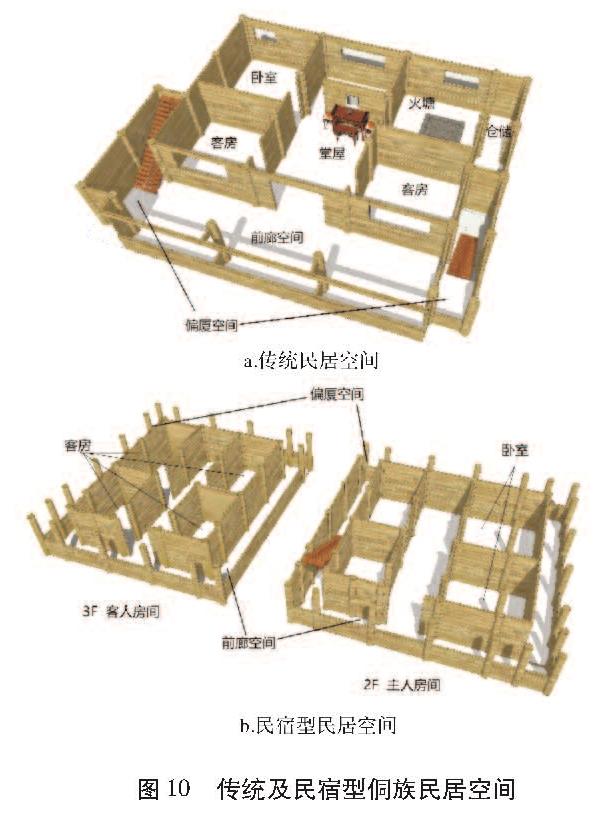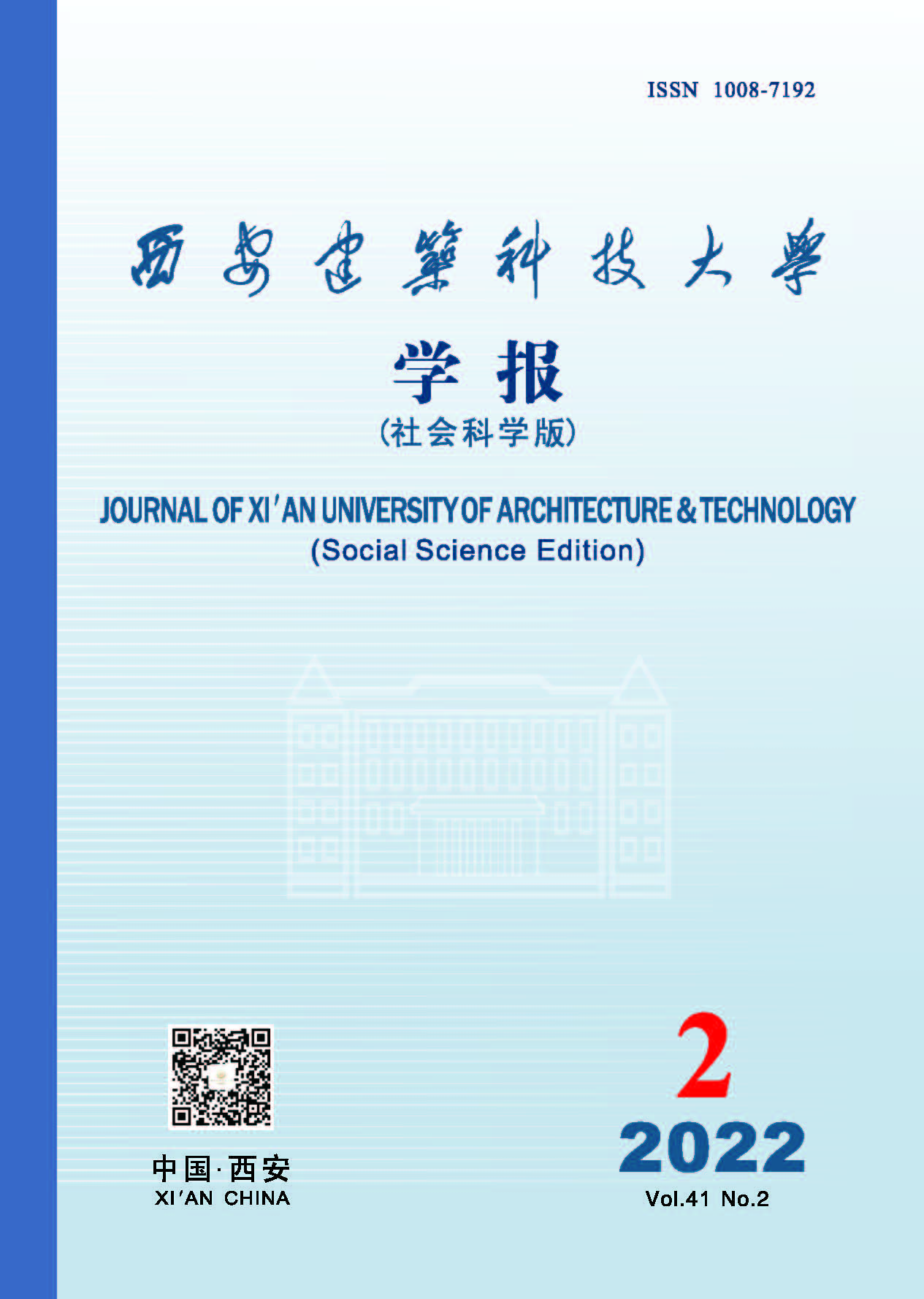在旅游经济的冲击下,高友村成为旅游目的地,大量游客涌入高友村,对高友村原始居民的生活方式带来较大的改变,其中变化较为明显的是侗族民居景观的布局形态。传统民居是侗族居民世代寄居的民居类型,民宿型民居是以游客为主要服务人群,以收益为目的的服务场所。空间句法是本文进行民居空间量化分析的主要方法,其句法参数是表现空间属性差异的重要手段。
3.1 传统民居平面布局量化分析
(1)传统民居居住层平面类型。据田野调查及相关文献的收集发现,侗族传统民居空间类型可分为“一字型”“L型”“U型”[14]三种平面形式(图2)。其中“一字型”为较常见的平面形式,这种平面类型具有较强的空间轴线,居住层空间依次为前廊、火塘、卧室及仓储空间。“L型”空间类型分布数量次于“一字型”,在三种平面类型中处于第二。从偏厦进入前廊空间,需再由偏厦穿过火塘才可进入卧室其他空间。最后一种平面类型为“U型”空间,经偏厦进入前廊,前廊空间与堂屋空间相连接,堂屋连接火塘及卧室仓储等其他空间,是侗族居民受汉族影响而形成的新的空间,替代之前火塘聚集的作用,并设先祖神位,类似于汉族厅堂[15]。
(2)三种平面类型空间句法分析。对以上三种侗族传统民居平面类型进行凸空间运算,计算结果如图3,依据计算结果构建空间拓扑关系,绘制空间拓扑图(图4)。
整合度是反映空间之间的可达性的指标,按照范围的不同可以分为全局整合度和区域整合度两种类型。全局整合度反映某一空间与所有空间之间的联系程度,区域整合度反映某一空间在周围有限个拓扑单位内空间的联系程度[16]。
三种平面布局的结果具有一致性,计算结果显示,全局整合度最高的空间是前廊空间,在三种平面类型中处于最高地位,表明前廊空间在整个居住层空间中可达性最高,对活动的吸引力最强。火塘整合度仅次于前廊,是侗族传统民居空间中聚集活动的场所。整合度最低的为卧室空间,表明卧室空间在侗族民居中作为私密场所而存在,卧室是主人生活休憩的主要场所,可见其隐私性对于侗族居民的重要性。火塘的区域整合度与前廊的区域整合度计算数值呈现相近状态,均明显高于周围其他空间,表明火塘与前廊拥有比周围空间更高地位,是日常活动优先选择的场所。
空间协同度是表示空间全局整合度与区域整合度关系的量化指标,通常用y=ax+b模型来进行模拟。用R2来表示研究对象协同度的大小,当R2=0.5时说明空间拟合度较好,当R2=0.7时表示空间拟合度为高拟合状态。拟合度是空间聚集性的直接表现,拟合度高表明空间聚集,是单核空间,反之为多核空间。
三种传统民居居住区平面协同度计算结果如图5。三种平面类型拟合度值分别为0.969、0.928、0.987,均大于0.7,表明空间拟合度较高。上述分析表明,侗族传统民居为拟合度较高的单核空间,室内居住层空间以火塘及堂屋作为主要核心区域,其他相关活动围绕核心空间展开。侗族民居单核空间的形成与侗族聚落思想分不开,在侗族民居中,一个火塘代表一个父系氏族,从而使得侗族民居在空间上形成较强的空间集合,这也是侗族民居建筑围绕以鼓楼为中心的核心区域分布的原因。
选择度表示某一空间出现在整个系统最短拓扑路径的可能性,表示这一空间交通量的大小,空间选择度越高,表明空间交通量就越大。
通过对三种传统平面类型的分析发现,空间可达性最高的区域为前廊,其次为火塘空间,最低的空间为卧室及仓储用房。前廊空间位于二楼前端,作为连接一层与三层的通道,承载着最多的空间交通量,无论是二层起居还是上下交通,前廊都是日常活动的必经之地。而火塘作为连接前廊与私密空间的过渡区域,承担着二层的日常活动,是在侗族传统民居中仅次于前廊的空间类型,也是侗族传统民居的特色空间。
(3)侗族传统民居居住层空间特征解析。通过对侗族传统民居居住层空间进行句法分析发现,传统侗族民居居住层可按私密性的不同分为三个层次:第一层次为前廊,是连接户外空间与室内空间的载体,也是侗族人民会客的主要空间,妇女与访客在前廊进行纺织等日常手工劳作,具备社交功能[17]。从空间的角度来看,前廊是侗族民居中唯一存在的半开敞空间,实现空间由内而外、由封闭到开敞的过渡。第二层次为火塘、堂屋,是主客空间的过渡区域,也是侗族进行家庭聚会、炊煮食物的主要空间,受汉族文化的影响,一些侗族民居将火塘空间进一步演化出堂屋,堂屋供奉先祖灵位,逐渐承载聚会等主要活动,地位不断加强,甚至取代了火塘,成为侗族民居中新的过渡空间。火塘、堂屋连接户内半开敞空间与封闭空间,形成侗族独具特色的标志空间。第三层次为卧室及仓储用房,是侗族传统民居中的私密空间,卧室空间较为狭小,可满足一对夫妇居住,卧室位于较安静区域,满足日常起居需求,与第一层次的前廊形成鲜明对比。
3.2 旅游背景下新民居平面布局量化分析
(1)民宿型民居居住层空间句法分析。高友村被列为第一批中国传统村落名录之后,旅游经济快速发展,旅游者的不断涌入导致高友村民居建筑开始转型成为民宿,将民居建筑转变成经营型民宿的过程称为民居的民宿化,传统民居民宿化成为包括高友村在内的传统村落面临的主要问题,民宿型民居也逐渐成为侗族村落中民居的主要类型。
笔者依据实地走访调查及资料收集发现,受旅游影响下的民宿型民居主要可以分为民宿化程度高、低两种类型,并绘制了具有代表性的民宿型民居平面类型(图7)。以其中居住层作为主要研究对象,仍然以空间句法理论为依据研究空间之间的拓扑关系,计算区域整合度(图8)。
对于民宿化程度低的民居空间,整合度较高的区域为火塘(1.05),其次为二楼及三楼空间中起到连接作用的视线通廊,该廊道作为侗族传统民居前廊的变形,兼具了现代空间中阳台的作用,是侗族传统民居民宿化的产物。对于民宿化程度高的民居空间,整合度较高的区域为起到连通作用的室内走廊(1.85),该空间的可达性较强,与现代室内走廊空间起相同作用,走廊连接卧室、客房等起居空间,是民宿化程度高的产物。
通过对民宿化程度不同的两种民居进行拟合度分析,探讨其空间协同度。研究发现,两种类型民居的拟合度分别为0.445、0.302,均低于0.5这一分界值,表明民宿型民居呈现出多核空间形态,通过对不同聚集区的研究发现,该多核空间为双核心空间。民宿型民居分别形成以主人聚集和客人聚集两种不同的类型单核空间,两种单核空间之间相互联系,共同构成了系统中的多核空间。多核空间的形成标志着侗族民宿型民居形成关联性较差的主客空间。
在民宿化程度不同两种空间中,选择度分析结果呈现一致性,即连接各个房间的廊道空间选择度最高,尽端空间如卧室及客房选择度较低。廊道空间包括半开敞的室外走廊及封闭的室内走廊两种形式,该空间在民宿中起到连接各个客房、卧室和偏厦的作用,是连接室内空间和室外空间的唯一通道,交通量较大。
(2)民宿型民居居住层空间特征解析。通过对发展成为民宿形式的民居进行句法分析,结果表明,按旅游影响程度的不同,侗族传统民居民宿可分为民宿化程度高和低两种类型,两种类型具有以下共性:前廊空间退化,形成室内走廊; 主客空间两极分化,特别是依据垂直交通呈现上下两极状态; 空间布局简化,在平面上不再呈现从外到内、从半开敞到封闭、从主到客的过渡形式,而是采用走廊直接连接客房的形式。两者因其民宿化程度的不同也存在差异性:对于受旅游影响小的民居建筑,空间布局仍然保留火塘这一侗族典型代表空间,并基本遵从一层仓储、二层起居的布局形式,代表内外连接的前廊演化为空间较窄的视线通廊,不再承担家庭纺织等活动; 而对于受旅游影响大的民居建筑,室内空间以走廊结构为主,卧室、客房沿走廊而设,空间布局简单。
3.3 旅游背景下新旧民居居住层平面布局对比分析
侗族传统民居与民宿型民居量化结果存在较大差异,结合句法分析结果及民居空间关系分析(图 10),其格局改变主要集中在火塘空间、前廊空间、主客空间三个空间关系及可达性与聚集性两个空间属性方面,究其根本是旅游冲击下侗族集聚思想的衰落所致。
(1)火塘空间演替。火塘作为侗族传统民居的代表性空间,是侗族家庭聚集的主要场所,满足侗族居民饮食等日常生活需求。通过对新旧两种类型传统民居进行空间句法分析得知:民宿型民居中火塘空间整合度相对于传统民居空间整合度而言呈现下降趋势,这一数值的改变代表侗族特色的火塘及堂屋空间逐渐失去其本来的作用,取而代之的是现代化厨房和客厅,民宿化程度低的民居仍然保留火塘,但已失去其“一塘一户”的侗族聚集思想[18],仅作为复古空间保留,不再具备家庭聚会、炊煮食物等功能。功能的丧失是火塘空间被取代的根本原因,也是在旅游发展的冲击下与现代居住空间同质化的突出表现。
(2)前廊空间退化。前廊空间与火塘空间相似,二者长期以来一直被作为侗族民居区别于其他民居类型的特征。通过空间句法量化分析结果可知:与传统民居不同,民宿型民居前廊空间整合度降低,在民宿化程度较低的民居中出现火塘空间整合度大于前廊空间的情况,说明在旅游背景下,前廊空间不再作为可达性最强的空间而存在,同时选择度的降低也表明前廊空间仅作为交通空间存在,渐渐丧失其功能性。在侗族民居发展过程中,前廊尺寸不断缩小,不再承担家庭休憩、妇女纺织等活动功能,仅作为观景平台而存在,其空间功能类似于现代住宅中的阳台空间,但仍然具有户外开阔空间到室内封闭空间的过渡功能。
(3)主客空间层叠。侗族传统民居居住层空间呈现主客交融的平面布局,主人与客人的互动于同一层展开,基于空间整合度及选择度的不同区分主客空间,形成主人空间较为隐蔽,客人空间较为开放的格局。而民宿型民居主客空间则将这种平面布局转化为竖向布局,为寻求更高的经济效益,侗族民居楼层呈现竖向增加状态。与传统民居中主客空间过渡发生在同一楼层不同,民宿型民居主客空间分为严格的上下不同的楼层,主客空间通过偏厦与室内楼梯连接,空间选择度降低,拓扑深度增加,表明主客空间联系逐渐弱化。
(4)空间可达性增强。通过空间句法分析结果及空间拓扑关系图可以清晰地看出受旅游发展的影响,侗族民居空间布局简化,空间序列性减弱,不再具有传统民居明显的过渡层次,卧室、客房整合度变高。民居服务功能的改变,使得卧室空间不再是隐私性极强的主人起居空间,转变成为交通简单、直达性强的客房。
(5)空间聚集性降低。通过对侗族传统民居及受旅游影响下形成的民宿型民居进行空间协同度分析可知:空间协同度由原先的大于0.7转变为小于0.5,表明侗族民居空间类型从单核空间逐渐转变为多核空间,空间聚集性的转变表明随着旅游业的发展侗族传统聚集思想的衰落,而聚集思想作为侗族的主导思想,其民族衰落是侗族被旅游同质化的表现。





